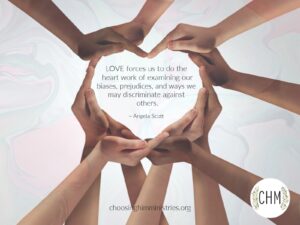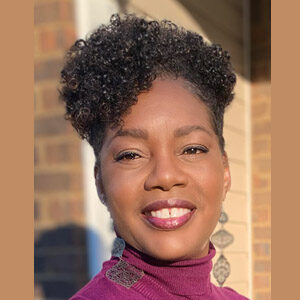“I am giving you a new commandment, that you love one another. Just as I have loved you, so you too are to love one another. By this everyone will know that you are my disciples, if you have love and unselfish concern for one another.” John 13:34-35 (AMP)
 Love one another; that is what the Bible tells us to do, but why is it so hard? Love requires vulnerability, transparency, humility, and empathy. Love takes self-reflection and sacrifice. Love can also make us feel uncomfortable. Love takes intentionality. Love forces us to do the heart work of examining our biases, prejudices, and ways we may discriminate against others.
Love one another; that is what the Bible tells us to do, but why is it so hard? Love requires vulnerability, transparency, humility, and empathy. Love takes self-reflection and sacrifice. Love can also make us feel uncomfortable. Love takes intentionality. Love forces us to do the heart work of examining our biases, prejudices, and ways we may discriminate against others.
The past two months have been difficult to say the least; but during this time the Lord has shown me that hard things can bring about change if we let it. Although there is hurt, disappointment, anger and frustration; we have an example of how to deal with hard things because of what Jesus endured. He left his throne at the right hand of God and came down to earth to save us. He broke cultural barriers to show love when no one would. He endured rejection from those he loved. He was beaten, vilified and killed by those who were threatened by Him; and yet still He commands us to love one another.
There are many barriers to loving one another. Some include physical barriers (space/location), perceptual barriers (seeing the world and experiences differently than others), emotional barriers (fear, mistrust, suspicion), cultural barriers (behavior that is accepted as a sign of belonging), language barriers, and interpersonal barriers (withdrawal, avoidance, and busyness).
Similar to barriers are blinders, which is defined as something that prevents someone from gaining a full understanding of a situation. Blinders can be detrimental to how we love one another because they keep us focused on ourselves, making us unable to see anyone else’s struggles or needs. We are not able to have empathy for others and therefore cannot begin to understand what they may be going through. Blinders obstruct our vision and can make us blind to the heartaches of our brothers and sisters.
As a black woman, I’ve had many experiences of prejudice, discrimination, and yes, even racism. Unfortunately, so have my children, which causes me to worry about them every time they leave home. Especially my son Jeremy. Now he knows the speech by memory. “No hoodies, no loud music, drive safely, be sure you always use your turn signals and that your break lights work to decrease your chances of being pulled over by law enforcement. If you are, put your hands in the 10 and 2 position on the steering wheel, follow all instructions, keep your tone down regardless of how you may be feeling, and be absolutely respectful no matter what. Call or text as soon as you get to where you’re going, and on your way back. Each time he leaves home I pray for the Lord to take my worry and anxiety away; to cover and protect him and bring him back to me the way he left. That speech may be new or even strange to you, but it’s our reality. I pray for the day that we will no longer have these conversations.
“My fellow believers, do not practice your faith in our glorious Lord Jesus Christ with an attitude of partiality [toward people-show no favoritism, no prejudice, no snobbery].” James 2:1 (AMP)
I must admit that I used to be ashamed of the history of oppression my ancestors experienced, and the harsh realities that many of us still go through today. But through my own research, my perspective has changed. Now, instead of shame I feel a sense of admiration, appreciation, and gratitude for the shoulders I stand on. We are a triumphant people, who have overcome unspeakable atrocities. We are still striving to be simply treated equally, but there is hope because of the One who made us all in His image.
So, what now? May I suggest seeking to gain knowledge by reading books, devotionals, and watching movies that relate to the subject of racism; but most importantly, be intentional about having a conversation with someone who you normally would not surround yourself with. You may not say everything right but entering the conversation with humility and vulnerability will set the stage for authentic and transparent dialogue. Remember that the only wrong thing to do or say is nothing at all. Then listen, listen, listen. Listening is a skill and it is the key to effective communication. I don’t know about you, but sometimes I hear but I don’t always listen. Listening takes effort and most importantly requires us to lay aside our ego.
Listening also takes self-reflection that leads to repentance, which is hard work. But our God is so gracious, He allows us to bring every emotion to him good or bad. He works in our hearts like a craftsman works on his most special piece. He unifies our hearts and brings it under the submission of the Holy Spirit. He shows us our blind spots. He puts people in our path to reach out to and gives us the courage to do so. He places the right words in our mouth and anoints our speech with blessings, and grace. He exchanges our prideful heart for a repentant one.
“Create in me a clean heart, O God and renew a steadfast spirit within me.” Psalm 51:10 (NIV)
Although my heart breaks for those that have and are still losing their lives due to the ugliness of systemic racism; my heart is hopeful that something is different this time. There is a shift. Many are rising up and are taking a stand who may have been indifferent before. Faith leaders are leading the way and are demonstrating that there is no tolerance for racism prejudice, discrimination or bigotry in the church. We are united in a way that I have never seen before. Laws and systems are being changed, but most importantly, hearts are being softened and transformed one at a time. We are finally starting to grasp God’s commandment to love one another.
“And if one member suffers, all the parts share in the suffering; if one member is honored, all rejoice with it.” 1 Corinthians 12:26 (AMP)

Angela Scott
CHM Contributor







